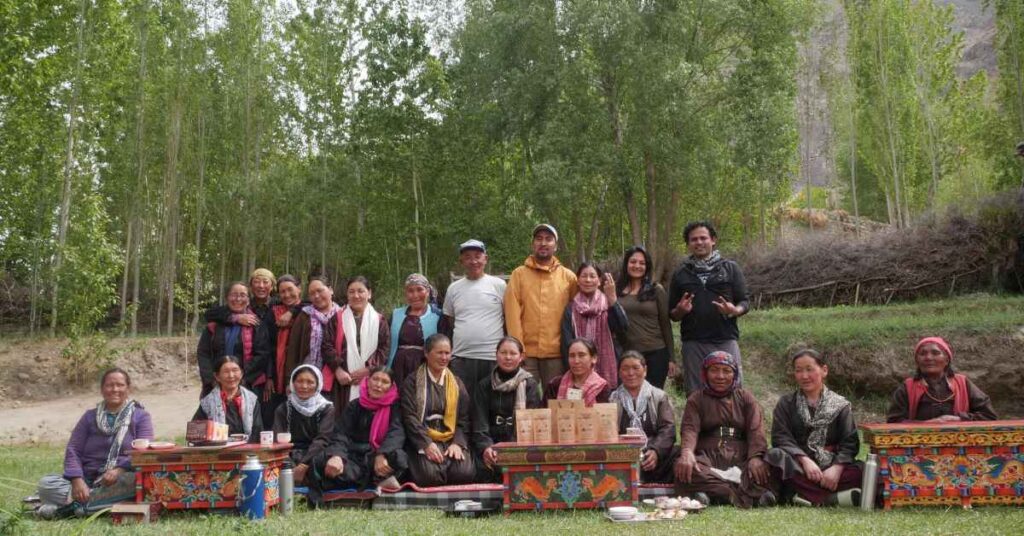In the remote and rugged terrain of Ladakh, where agriculture often battles harsh climates and limited infrastructure, a quiet revolution is taking root. At the center of this transformation is Tsetan Dorjay, a 27-year-old entrepreneur and founder of Siachen Naturals, a grassroots agribusiness that is revitalizing barley cultivation and placing women farmers at the heart of sustainable rural development.
Barley Farming Finds New Purpose
Barley, long considered a staple in Ladakhi cuisine, was on the brink of extinction from local fields. Despite its integral role in traditional dishes like thukpa, tsampa, and skyū, farmers were abandoning it due to its low commercial value.
“Even if we were growing barley, we couldn’t sell it,” says Tsering Chondol, one of the 30 women farmers now associated with Siachen Naturals. “It was seen more as a cultural habit than an economic crop.”
Recognising both the cultural and agricultural value of barley, Dorjay launched Siachen Naturals to create a market for this indigenous grain. The brand procures organically cultivated barley directly from farmers at above-market rates and transforms it into value-added products such as barley porridge, soups, and teas, now gaining popularity across India.
Integrating Clean Energy and Traditional Wisdom
Siachen Naturals merges traditional agricultural methods with modern sustainability practices. Barley flour, for instance, is milled using traditional water mills, which function on hydro principles and consume no electricity. “The principle is similar to a hydroelectric plant—eco-friendly and efficient,” Dorjay explains.
The enterprise is now introducing solar dryers to improve post-harvest processing. While farmers in Ladakh have traditionally sun-dried cheese, herbs, and fruits, the exposure to wind and dust often compromised quality. Solar dryers—maintaining optimal temperature and humidity—offer a hygienic and nutrient-preserving alternative.
This technology is being extended to Halman apricots, wild nettle, and caraway—all of which hold both culinary and medicinal significance in Ladakhi culture. Dorjay aims to process and market these herbs separately in dried forms, expanding income streams for local communities.
A Model Rooted in Equity and Community Participation
The success of Siachen Naturals lies in its inclusive and self-sustaining business model. Farmers are paid ₹75 per kilogram of barley—significantly higher than the standard ₹60. Additionally, self-help group (SHG) partners receive a monthly stipend of ₹10,000, regardless of raw material procurement, ensuring consistent financial support.
“When I began farming in 2019, I realised people were working hard but barely earning. Women had started working for road construction agencies like the BRO for stability. I wanted to create an alternative that let them return to what they loved—farming,” says Dorjay.
He credits his formative experience at SECMOL (Students’ Educational and Cultural Movement of Ladakh) for helping shape this vision. “It gave me a deeper understanding of how migration, modernisation, and climate change were affecting Ladakhi communities. The answers had to come from within,” he adds.
Scaling a Local Solution to National Impact
Siachen Naturals’ product line, now available online and across selected retail channels, includes barley soup with dried mushroom and tomato, nettle soup, and sweet barley porridge with dried apricots. Plans are underway to add packaged herbs and solar-dried fruits.
What began as an effort to revive a crop has grown into a rural development model, offering lessons in how climate-resilient agriculture, women’s empowerment, and indigenous knowledge can converge for scalable impact.
As consumer demand for ethical and organic products rises, Siachen Naturals stands as a promising case study of how entrepreneurial innovation rooted in local culture can help secure both livelihoods and legacies.


